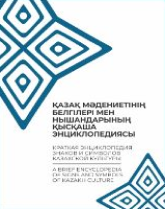




The severe cooling that occurs after the onset of warm days at the beginning of spring among the Kazakhs is called besqonaq, which literally means “five guests.” An old legend says that once five friends came to visit and on their way they were hit by a heavy storm that killed them in the steppe. There is a similar legend among the Bashkirs. Among the Kazakhs in Manğystau there is another legend, according to which long ago 365 saints came to this region and 5 of them left without settling in this area.
According to experts, Besqonaq are epohomena (additional monthly days) in the traditional Kazakh calendar. For the first time such additional days were used in the ancient Egyptian calendar, which bears the names of the gods – Osiris, Horus, Seth, Isis and Nephtida – the gods who embody the elements of nature.
Besqonaq is thus the addition of 5 days (and 6 days in leap years) at the end of the year to correspond to the astronomical year, which in Kazakhstan consists of 360 days according to the traditional calendar. As a rule, Besqonaq falls on March 17-21 according to the modern calendar, and on March 16 in leap years. According to him, Kazakhs made a prediction, the stronger the Besqonaq – the warmer and rainier the summer. Exactly, after Besqonaq – Kazakhs began to move the summer zhailau. Understanding of this recurring natural phenomenon testifies to deep knowledge of astronomy and religious-mythological representations of the earth, sky, stars, etc., and served as a sign-symbol of the beginning of a new economic stage, the natural cycle of nomadic production.


